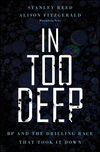
In Too Deep: BP and the Drilling Race That Took it Down
| List Price: | US $24.95 |
| Government Price: | US $12.72 |
In Too Deep: BP and the Drilling Race that Took It Down
IN TOO DEEP
BP and the Drilling Race That Took It Down
By Stanley Reed and Alison Fitzgerald
Is it possible that the implosion of the BP’s oil well in the Gulf of Mexico on April 20, 2010 could have been avoided, thus sparing the lives of eleven crew members and preventing the worst environmental disaster in U.S history? In IN TOO DEEP: BP and the Drilling Race That Took it Down (Wiley/Bloomberg Press; January 17, 2011; $24.95; 9780470950906; Hardcover), investigative reporter Alison Fitzgerald and Stanley Reed, a journalist who has covered BP for over a decade, show that the tragedy of the Deepwater Horizon was not simply a horrible accident. It was a disaster that many say was long in the making, was foreseeable, and almost inevitable.
Reed offers a unique perspective on BP because after more than ten years reporting on the company, he knew all three of the CEOs that appear in IN TOO DEEP—especially John Browne, the most colorful and important one. In addition, Reed spent time with the company’s Gulf of Mexico team less than a year before the blowout and visited the company’s most high profile facility in the Gulf, Thunderhorse. These experiences gave him an insider’s look at how BP worked in the Gulf.
More from INSIDE TOO DEEP:
- While several investigations have drawn conclusions about immediate technical causes of the BP blowout, IN TOO DEEP shows that BP's corporate culture made the accident almost inevitable.
- The April 20th blowout of 2010 was only the latest of a series of BP accidents that should have served as warning signs to company executives and regulators.
--In 1995, an oil refinery in Texas City, Texas exploded killing 15 people. BP was fined millions by the Justice Department.
--In 1996, the pipeline network on Alaska's North Slope that's operated by BP had two spills. The investigation showed the company had neglected maintenance for years. The pipelines are continuing to have problems to this day.
--In 2000, the company's Grangemouth, Scotland refinery suffered a massive fire.
- The Horizon disaster ruined President Barack Obama's plan -- two years in the making -- to get a climate change law passed. Just after winning the Democratic presidential nomination in 2008, Obama pushed Democrats to agree to allow more offshore drilling in exchange for Republican support for a climate law. The BP oil spill killed hopes for both.
- BP is the most creative of the big oil companies at finding oil and gas. It is the leading oil and gas producer in the U.S. and in the deep water of the Gulf of Mexico. The company's financial troubles after the oil spill may lead it to concentrate even more on deepwater drilling.
- Former CEO John Browne -- whose father worked for BP's predecessor and who himself worked for BP his entire career -- turned the company into a powerhouse by chasing oil in difficult places. However, he failed to appreciate the huge dangers of drilling and refining and therefore never made safety a top priority at BP.
- Browne rose to the top of his industry, and the business world, by building BP into one the largest oil companies on earth. He was knighted by Queen Elizabeth. However, he resigned in disgrace after a personal scandal and his reputation is becoming further tainted by the massive gulf oil spill.
- BP's workers were so pressed to make their financial targets that they cut corners without regard to risk and they were aware of the tradeoffs they were making, according to internal corporate studies and documents.
- BP has been investigated, cited, fined and convicted by federal safety, environmental and criminal authorities more than any of its peers in the US over the last decade.
The story of how the Gulf disaster happened, and of the behind-the-scenes management of the company, is a fascinating object lesson that we will be learning from for decades. In July 2010, BP successfully plugged the company’s damaged deepwater well. But the environmental fallout and public relations campaign to rebuild the brand are just beginning. IN TOO DEEP details why BP suffered this disaster, why now, and what’s next for the oil giant.
ABOUT THE AUTHORS
STANLEY REED was London Bureau Chief of BusinessWeek from 1996-2010. He is a specialist on the Middle East and energy. He has covered BP for more than a decade and accompanied then-CEO John Browne on a trip to Russia in 2003. He also visited BP’s Thunderhorse, the largest oil platform in the Gulf of Mexico, in 2009. He is now a reporter-at-large for Bloomberg News.
ALISON FITZGERALD, an investigative reporter at Bloomberg News, writes about the convergence of government and economics in Washington, D.C. Her coverage of the financial crisis and government rescue of the banking industry won her the 2009 George W. Polk Award for national reporting and the “Best of the Best” award from the Society of American business Editors and Writers. Her 2008 work on the global food crisis was honored by the Overseas Press Club.
IN TOO DEEP
By Stanley Reed and Alison Fitzgerald
Wiley/Bloomberg Press; January 17, 2011
$24.95; 978-0-470-95090-6; Hardcover



